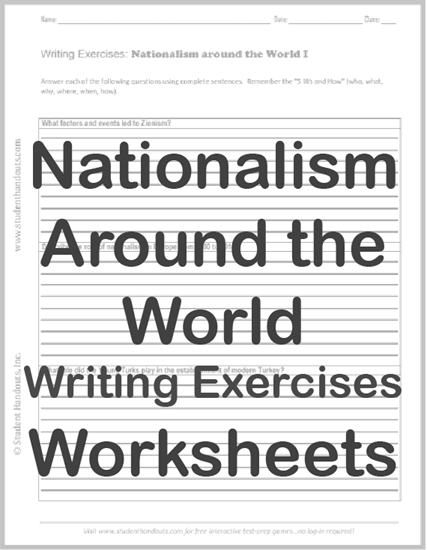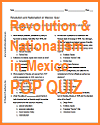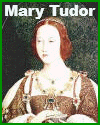| Nationalism Around the World Writing Exercises Worksheets |
|---|
| www.studenthandouts.com ↣ World History ↣ Global Nationalism ↣ Global Nationalism Worksheets |
 |
    |
|
Writing Exercises Handout #1: 1 What factors and events led to Zionism? Zionism emerged in the late 19th century as a response to rising anti-Semitism in Europe, including pogroms in Eastern Europe and discriminatory laws. The failure of assimilation and growing nationalism across Europe led many Jews to seek a homeland. The Dreyfus Affair in France further highlighted Jewish vulnerability. Inspired by these events, Theodor Herzl and others promoted Zionism—the movement for a Jewish state in their ancestral homeland, Palestine. 2 Describe the role of nationalism in Europe from 1800 to 1914. From 1800 to 1914, nationalism played a major role in reshaping Europe. It fueled movements for unification in Germany and Italy, inspired independence efforts in regions like Greece and the Balkans, and weakened multi-ethnic empires such as Austria-Hungary and the Ottoman Empire. National pride and competition also increased tensions among European powers, contributing to rivalries that eventually led to World War I. 3 What role did the Young Turks play in the establishment of modern Turkey? The Young Turks were a reformist political movement in the late Ottoman Empire that sought to modernize and secularize the state. They overthrew Sultan Abdulhamid II in 1908 and restored the constitution. Their push for centralization and nationalism laid the groundwork for the collapse of the empire and the rise of modern Turkey. Their influence helped pave the way for Mustafa Kemal Atatürk's later reforms and the establishment of the Turkish Republic. Click here to print. Answers will vary. |
|
Writing Exercises Handout #2: 1 Explain how Italy became unified. Italy became unified in the 19th century through a combination of diplomacy, warfare, and nationalist movements. Count Cavour of Sardinia used alliances and war to gain northern territories, while Giuseppe Garibaldi led volunteer forces to liberate the south. Both regions joined under King Victor Emmanuel II. By 1861, most of Italy was unified, and by 1870, Rome became the capital, completing unification. 2 Describe the role of Otto von Bismarck in German unification. Otto von Bismarck played a crucial role in German unification through his policy of "blood and iron," using war and diplomacy to unite the German states under Prussian leadership. He led successful wars against Denmark, Austria, and France, which stirred nationalist pride and weakened opposition. In 1871, Bismarck declared the German Empire in the Hall of Mirrors at Versailles, with King Wilhelm I as emperor. 3 What role did nationalism play in Indian social and political life during the era of the British Raj? During the British Raj, nationalism became a unifying force in Indian social and political life. It inspired resistance to colonial rule and fostered a growing sense of Indian identity across diverse regions and cultures. Nationalist leaders like Bal Gangadhar Tilak and later Mahatma Gandhi mobilized the public through movements, protests, and calls for self-rule. Nationalism helped lay the foundation for India's eventual independence in 1947. Click here to print. Answers will vary. |
| www.studenthandouts.com ↣ World History ↣ Global Nationalism ↣ Global Nationalism Worksheets |














































